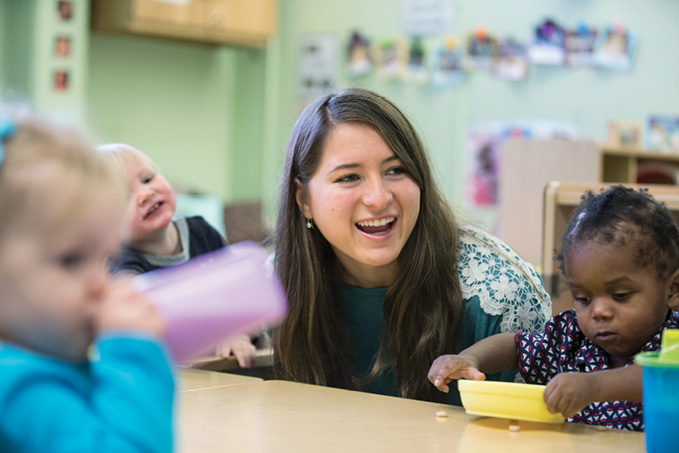
Children of all ability levels are immersed in a culture of acceptance at the Susan Gray School at Peabody, the first nationally recognized inclusive preschool. One-third of the students at SGS have an intellectual or physical disability.
The school provides a fertile training ground for a select cadre of graduate students in Peabody’s early childhood special education program. The Susan Gray fellows, who are generously supported by Vanderbilt alumnus H. Rodes Hart, assist the teachers in each of the school’s eight classrooms.
Hart, who was instrumental in launching the fellowship, covers the fellows’ salaries and Peabody tuition.
“The Susan Gray School is particularly special to my wife Patricia and me, and we find deep joy in supporting the fellows program,” Hart says. “Today, the fellows play a critical role at the school by bringing fresh ideas and perspectives. Tomorrow, the fellows will be the leaders in the field—creating environments where all children, including those with developmental disabilities, can learn together side by side.”
When Brandy Locchetta, M.Ed.’14, became a Susan Gray fellow, she had spent 13 years in early childhood education. She now manages the Inclusion Program for the Georgia Department of Early Care and Learning. Locchetta believes her experiences at SGS prepared her to confidently interpret research, as well as create systems and procedures to support the state’s early-learning workforce.
“I’m in a position to use my knowledge and experience to inform state initiatives and policy, which can ignite change that results in positive outcomes for young children and their families,” Locchetta says.
A math coach for pre-K teachers in the New York City Department of Education’s Pre-K for All professional development tracks, Meghan Brennan, M.Ed.’16, has found that her time at SGS allowed her to apply what she learned in her graduate studies to everyday experiences in the classroom.
“All students, no matter how young, have their own special interests, strengths and goals, and it’s our job as teachers to find out what they are and build upon them,” Brennan says. “The master’s program and Susan Gray make this the forefront of the work we do with children, which is something I carry with me into each classroom I visit, each student I meet, and, most important, each teacher I work with.”
Alexis Schulenburg, B.S.’16, M.Ed.’18 (anticipated), plans to become an early childhood teacher or applied behavior analyst for young children with disabilities. Her time as a fellow showed her the range of possible careers and prepared her well for her own classroom.
“I’m highly qualified to work in either, and I’m equally excited to work in either,” she says. “This has been the most educational, challenging and empowering experience I could have asked for in a master’s program.”
The Susan Gray School, originally named the Peabody Experimental School, opened in 1968 as an on-campus research-oriented school devoted to educational research involving young children with developmental disabilities and children whose future development was at risk because of conditions such as poverty. In 1986 the school was renamed the Susan Gray School in recognition of Susan Gray (1913–1992), a pioneering Peabody faculty member and national authority on childhood early education.
By Jane Sevier
SaveSave